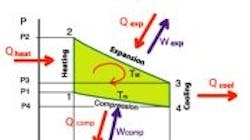More efficient heat pumps?
New technology coming out of Purdue University may end up maintaining the efficiency of heat pumps in cold weather, making them economical alternatives in northern climes. So says Eckhard Groll, a professor of mechanical engineering who is working on the project with mechanical engineering professor James Braun and W. Travis Horton, an assistant professor of civil engineering.
The innovation aims to improve heat-pump efficiency in general but is especially practical for boosting performance in cold climates.
Purdue researchers are partnering with Emerson Climate Technologies Inc. and Carrier Corp. on the work. Emerson will work with researchers to create the prototype heat pump, and Carrier will integrate the new heat pump into a complete system.
The new technology works by modifying the conventional vapor-compression cycle behind standard air conditioning and refrigeration and could be realized through relatively simple modification to existing heat pumps, refrigeration and air conditioning systems, researchers say. The standard vapor-compression cycle has four stages: refrigerant is compressed as a vapor, condenses into a liquid, expands to a mixture of liquid and vapor, and then evaporates.
The project will investigate two cooling approaches during the compression process. In one approach, relatively large amounts of oil are injected into the compressor to absorb heat generated throughout the compression stage. In the second approach, a mixture of liquid and vapor refrigerant from the expansion stage is injected at various points during compression to provide cooling. The added steps improve the compression process while also reducing energy losses due to friction in the expansion stage.
"Cooling the compressor keeps the refrigerant dense, and that's important because it takes less energy to compress something that's more dense," Braun said.
The researchers are developing a system for precisely controlling the flow of refrigerant from the evaporation stage into the compression stage using a series of small valves. The new heat pump also uses a scroll compressor to compress refrigerant. Domestic heat pumps normally use reciprocating compressors which can't work with an injected liquid.
Researchers also say the project will attempt to determine the efficiency of a machine that pumps liquid while also compressing gas, a task that will involve a lot of computational modeling.
The work grew out of research into the Ericsson cycle in which liquid is added to coolant as it is being compressed. The Ericson cycle, however, does not use the vapor-compression cycle because the gas never turns to liquid.
The Purdue team will present papers on their work during the 13th International Refrigeration and Air Conditioning, the 20th International Compressor Engineering Conference and the first International High Performance Buildings Conference from July 12-15 at Purdue. The papers were written by mechanical engineering doctoral students Margaret Mathison and Ian Bell.The Purdue researchers also are working in a related project with the California Energy Commission.
Go here to see a video of a scroll compressor in action: http://jbarrownews.blogspot.com/2007/09/digital-scroll-compressors-just-plain.html
Compressor engineering conference: https://engineering.purdue.edu/Herrick/Events/index.html
